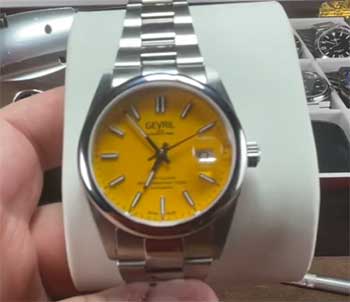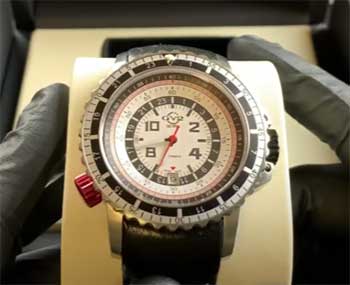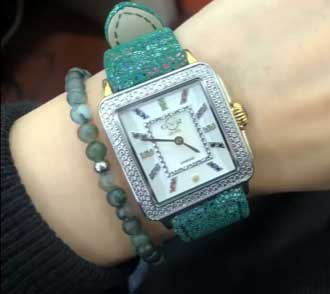Gevril watches have exploded in popularity in recent years for their surprisingly affordable prices compared to luxury Swiss watches or even other fashion watch brands.
As consumers become more price conscious and value-focused, Gevril has capitalized on their position as an accessibly priced watchmaker.
But this leaves many shoppers wondering – how does Gevril keep their prices so low relative to competitors? Gevril timepieces often retail for under $500, an inexpensive price point compared to luxury brands that sell for thousands if not tens of thousands.
Let’s explore the various factors that allow Gevril to maintain such comparatively low pricing across their collection.
Reasons For Gevril Watches Being So Cheap
Here is a list of those reasons:
- Use of Quartz Movements Reduce Manufacturing Costs
- Outsourced watch assembly keeps labor costs low
- Use of Common Watch Materials Rather Than Precious Metals
- Direct-To-Consumer Sales Bypass Dealer Markups
- Limited Advertising and Brand Marketing
- Strong Value Propositions With an Emphasis on Affordability
- Minimal Investment in In-House Movements
- Limited Styles and Collections
Let’s talk about those reasons in detail.
Use of Quartz Movements Reduce Manufacturing Costs

One of the biggest reasons Gevril watches sell for budget-friendly prices comes down to their internal movements.
The movement refers to the inner-workings of a timepiece, the tiny mechanism that tracks the passage of time and drives the watch hands.
Gevril relies on quartz movements for the vast majority of their watches.
Quartz refers to the quartz crystal used in the movement to electronically oscillate and divide time into precise increments.
This electrical signal powers the stepper motor that moves the watch hands.
Quartz movements are much cheaper to produce compared to mechanical movements which require intricate miniaturized components, frequent lubrication, and extensive hand-assembly. With quartz movements, manufacturers can streamline and automate much of the production.
This allows Gevril to buy reliable quartz movements in mass quantity at low cost. Passing these savings onto the customer is central to Gevril’s affordable pricing. Most luxury watchmakers use in-house mechanical movements that while of superior quality, require far more investment to create.
By sticking with commonly available quartz movements, Gevril escapes the high startup and maintenance costs of mechanical watch production. The electronically simplicity of quartz gives Gevril valuable budget flexibility when it comes to pricing their timepieces.
Outsourced Watch Assembly Keeps Labor Costs Low
In addition to sourcing inexpensive quartz movements, Gevril keeps productions costs low by outsourcing the assembly of their watches. Most Gevril watches are assembled in factories in China and Hong Kong.
Low cost of labor is the driving factor in this manufacturing strategy. Switzerland is known for its skilled labor and state-of-the-art facilities for watchmaking. But all that skill and precision comes as a tremendously high cost.
China and Hong Kong offer highly capable workforce and facilities at a fraction of the price. Gevril capitalizes on these savings by contracting out production to dedicated firms in these regions. Without the huge labor overhead incurred by watchmakers in Switzerland or Germany, Gevril can allot more resources into design and materials rather than manufacturing.
Some consumers have misconceptions of lower quality associated with outsourced manufacturing. But facilities in China and Hong Kong are more than capable of assembling high quality timepieces to Gevril’s exact specifications.
Low production overhead directly contributes to Gevril’s consumer-friendly costs.
Use of Common Watch Materials Rather Than Precious Metals

Another way Gevril achieves appealing price points is through their strategic use of watch case materials.
Luxury watches often use precious metals like gold, platinum, palladium and silver for their cases.
These materials drive up costs tremendously.
Stainless steel makes up the majority of Gevril cases.
Occasional use of brass, titanium, resin, and carbon fiber offer varied choices. But across all their watches, Gevril avoids precious metals in favor of common, affordable case materials.
Similarly, most Gevril watches feature mineral glass crystals rather than sapphire crystals common on luxury timepieces. Mineral glass lacks the scratch resistance and optical clarity of sapphire, but carries a much lower price tag.
Leather and stainless steel watch bands also help Gevril mitigate costs compared to the premium alligator, calfskin, titanium, or precious metal bands luxury brands rely on.
Prioritizing these attainable metals, crystals, and band materials provides Gevril distinctive but reasonably-priced alternatives to luxury materials. Keeping material expenses low allows room in the pricing structure for solid craftsmanship and design.
Direct-To-Consumer Sales Bypass Dealer Markups
Gevril also departs from most of the watch industry by selling directly to consumers through their website rather than relying on an authorized dealer network.
This strategy has multiple financial benefits. First, it avoids dealer margins which can run 40-50% on luxury watches. Without needing to build in this added markup, Gevril can price closer to the manufacturing costs.
Direct sales also avoid multiple levels of middlemen between the factory and the end customer. By managing their own international e-commerce platform, Gevril does not need salespeople taking commissions or retailers adding dramatic markups.
Selling directly to the public allows Gevril to foster a value-focused brand. And the cost savings compounds, giving Gevril greater freedom in crafting affordable MSRP prices across their watch collections.
Limited Advertising and Brand Marketing
Unlike powerhouse brands like Rolex and Omega that invest millions into advertising, celebrity sponsorships, and brand building, Gevril puts minimal money into marketing.
Most customers discover the brand through internet searches, online reviews, or word-of-mouth referrals. With a small advertising budget, Gevril pours resources into product design and functionality rather than glossy magazine spreads.
This streamlined marketing approach focuses spending on the watches themselves rather than public perception of the brand. By keeping customers satisfied with quality timepieces, Gevril builds brand reputation efficiently even without a luxury marketing budget.
Passing these savings directly to buyers allows Gevril to compete at price points far below other fashion and luxury brands who spend lavishly on brand marketing.
Strong Value Propositions With an Emphasis on Affordability

Rather than attempting to compete head-to-head with luxury Swiss brands on prestige and pedigree, Gevril wisely positions itself on value propositions.
Their focus centers on offering thoughtfully designed, well-constructed watches with strong feature sets at reasonable prices.
Gevril forgoes the luxury frills, ornate decorative embellishments, and inflated price tags designed to denote exclusivity and status.
Instead, their streamlined, straightforward watches simply offer consumers an affordable way to purchase nice timepieces.
By avoiding the pretense and posturing of luxury branding, Gevril appeals to more cost-conscious buyers. Their messaging targets the value segment by emphasizing fair pricing for impressive quality. This positioning allows their minimalist, functional watches to avoid luxury markups.
Gevril also sidesteps the high-priced aftermarket of used luxury watches which can drive prices many multiples above retail. As an accessibly priced fashion brand, Gevril watches sell close to their original MSRP even in resale markets.
So in summary, Gevril keeps prices low across their watch collections through:
- Use of inexpensive quartz movements
- Outsourced manufacturing in China/Hong Kong
- Common, affordable watch materials
- Direct to consumer sales
- Minimal brand marketing and advertising
- Strong value positioning and focus on fair pricing
Together these strategic decisions allow Gevril to sell thoughtfully designed watches at price points under $500, offering an affordable alternative to luxury brands priced in the thousands.
By sticking to their positioning and avoiding inflating brand prestige and exclusivity, Gevril makes reasonably priced, impressive watches accessible to value-focused buyers.
Here are two more reasons to talk!
- Minimal Investment in In-House Movements
Luxury watch brands often develop proprietary in-house movements, requiring massive investments in research, engineering, prototyping, equipment, and skilled watchmakers.
Gevril sidesteps these huge startup costs by sourcing reliable mass-produced quartz movements. Without a large budget allocated to in-house movement innovation, Gevril puts savings into pricing and design.
- Limited Styles and Collections
Many watch brands diversify into dozens if not hundreds of watch families and complications, necessitating expanded facilities and inventories.
Gevril streamlines their collections into a tightly curated set of men’s and women’s styles in a few essential colorways. This focus reduces overhead while allowing emphasis on nailing core models at low price points.
Also Read: Why Are GV2 Watches So Inexpensive?
Frequently Asked Questions (FAQ)
No, Gevril is not positioned as a luxury watchmaker. Their prices are far more affordable than luxury Swiss watch brands, with most Gevril watches retailing under $500. They compete based on value propositions rather than prestige.
Gevril produces their watches in partner factories in China and Hong Kong in order to benefit from lower labor costs compared to Switzerland or Germany. Outsourced manufacturing is key to their pricing advantage.
For the most part, Gevril watches are not highly collectible or likely to appreciate much in value over time. As an accessibly priced fashion brand, Gevril does not attract serious collector interest like luxury Swiss mechanical watches. Their low prices and quartz movements make them less appealing as collectibles.
Gevril Group, founded in 2001, owns the Gevril brand. They are headquartered in the British Virgin Islands. Gevril Group oversees the development, sourcing, marketing and distribution of Gevril watches sold worldwide.
Wrapping Up
In summary, by utilizing quartz movements, outsourced manufacturing, common materials, streamlined sales, minimal marketing, and restrained collections, Gevril sells thoughtfully designed watches at unusually affordable pricing, delivering strong value to the budget-conscious consumer.



